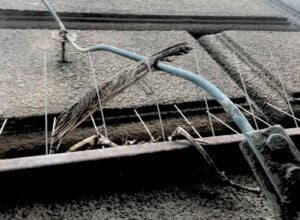Paulina Januszewska: „To nie jest powódź tysiąclecia, przed nami tysiąclecie powodzi” – post o takiej treści zamieściły w swoich mediach społecznościowych aktywistki inicjatywy Wschód. Mają rację?
Prof. Zbigniew Karaczun: Tak. Jeśli nie wprowadzimy rozsądnej polityki klimatycznej, musimy liczyć się z tym, że powodzi będzie prawdopodobnie więcej i staną się częstsze, a przy tym bardziej katastrofalne i tragiczne w skutkach.
„Ale przecież powodzie wydarzały się zawsze. W 1997 roku też mieliśmy wielką powódź” – mówią osoby studzące „alarmizm klimatyczny”. Co by im pan odpowiedział?
Oczywiście, że powodzie i susze to nie są nadzwyczajne zjawiska. Niepokojące jednak jest to, że obserwujemy trend zmian ich częstotliwości oraz nasilenia. Od 2011 roku mamy w Polsce permanentną suszę letnią przerywaną coraz bardziej nawalnymi opadami. To znaczy, że ubywa małych opadów (10–20 mm w ciągu doby) na rzecz zwiększania się ilości opadów nawalnych, powyżej 70 mm/dobę, oraz katastrofalnych, powyżej 100 mm/dobę. Na zjawiska występujące naturalnie nakłada się zmiana klimatu wywołana przez człowieka.
Jakie konkretnie procesy wpływają na to, że powódź staje się bardziej dotkliwa?
Najbardziej oczywisty, bezpośredni i związany ze zmianą klimatu jest wzrost średniej temperatury. Ten rok był rekordowy pod względem wartości wskazywanych przez termometry. Im jest cieplej, tym intensywniejsze parowanie, a to oznacza, że tym więcej wody, która musi z powrotem trafić do obiegu w postaci deszczu, zbiera się w atmosferze. To działa – mówiąc w dużym uproszczeniu – w dwie strony.
Dlatego jednocześnie mamy suszę i powódź?
Tak. Parowanie powoduje suszę, a późniejsze opady są bardzo gwałtowne i mogą spowodować, jeżeli nie taką powódź, jak obserwujemy w tej chwili na Dolnym Śląsku, to błyskawiczną, którą kilka tygodni temu widzieliśmy w Krakowie, Zamościu czy Wielkopolsce.
Na tę sytuację nakłada się bardzo niemądra polityka prowadzona w zakresie gospodarki wodnej. Walczymy z wodą, zamiast starać się z nią współpracować. Problem tkwi w tym, że w Polsce po 1989 roku całkowicie odrzuciliśmy planowanie przestrzenne, stwierdzając, że to wymysł komunizmu. W związku z tym zabudowano i ciągle się zabudowuje tereny zalewowe.
Istotne jest również to, jak bardzo uwierzyliśmy w narrację, że jesteśmy mądrzejsi od natury i że rozwiązania czysto inżynierskie oraz techniczne są bardziej skuteczne niż oparte na naśladownictwie czy próbie wykorzystania przykładów podpatrzonych w przyrodzie. A potem jesteśmy zdziwieni, że ta okazuje się od nas silniejsza. Nie zatrzymujemy nadmiaru wody, tylko robimy wszystko, by jak najszybciej odprowadzić ją do Bałtyku. Budujemy wały, które – jak się okazuje – nie wytrzymują naporu wody albo są zbyt niskie w stosunku do ilości wody, która wpływa, i to powoduje takie katastrofy jak obserwowana dziś na Dolnym Śląsku.
Jak więc należy zarządzać przestrzenią i wodą?
Powinniśmy wprowadzać tzw. natural-based solution, czyli rozwiązania oparte na naturze, na przykład renaturalizować bieg rzek czy przywracać mokradła. Przede wszystkim jednak należy wrócić pomysłu polderów, to jest pewnego rodzaju suchych zbiorników retencyjnych – terenów w sąsiedztwie rzek, pozbawionych infrastruktury, na którą może rozlewać się woda, dzięki czemu fala powodziowa ulega spłaszczeniu, i porozumieć się z rolnikami, aby ich łąki i pola uprawne pełniły tę funkcję. Jeżeli woda będzie tam retencjonowana, jeżeli tam się zatrzyma, to zwyczajnie nie wyleje się w miastach i terenach zurbanizowanych. Musimy też poprawić system planowania przestrzennego i przestać budować na terenach zalewowych.
„W Kotlinie Kłodzkiej do największych opadów doszło bezpośrednio nad masywem Śnieżnika, z którego woda spłynęła, tworząc wezbrania na rzekach. Właśnie w masywie Śnieżnika od lat wycinano górskie lasy na potęgę, obniżając zdolności retencyjne” – napisał Jan Mencwel. Czy rzeczywiście wycinki należy dołączyć do działań wzmagających zagrożenie powodziowe?
Nie wiem, jak w szczegółach pod tym względem wygląda sytuacja akurat na Dolnym Śląsku, więc to zostawiam innym ekspertom. Natomiast zgadzam się z tym, że problem wycinki lasów górskich i dosyć intensywnej gospodarki leśnej, polegającej właśnie na pozyskiwaniu dużych ilości drewna w różnych regionach Polski, przede wszystkim w górach, ma ogromny wpływ na obieg wody w przyrodzie. Lasy są bowiem ogromnym, naturalnym zbiornikiem retencyjnym. Rozwiązaniem, które w Polsce przebija się powoli do szerokiej świadomości, jest renaturyzacja terenów podmokłych w lasach jako coś, co stanowi mądre gospodarowanie wodą i przykład działania adaptacyjnego do zmiany klimatu.
Joanna Kopczyńska, prezeska Wód Polskich, poinformowała, że do zbiornika Mietków nastąpił nieprognozowany zrzut wody ze zbiornika administrowanego przez Tauron. Donald Tusk jest w szoku. A pan?
Myślę, że jest to problem instytucjonalny. Tego typu działania powinny być bardzo uważnie zarządzane. Na razie wymagają wyjaśnień. Nie mogę stwierdzić, czy zrzut wynikał z braku przepisów czy braku koordynacji działań pomiędzy spółką a instytucjami publicznymi, ale mógł, oczywiście incydentalnie, przyczynić się do wystąpienia dodatkowych niebezpiecznych sytuacji. Nie możemy jednak powiedzieć, że cały problem z powodziami i katastrofą obserwowaną na Dolnym Śląsku spowodowało spuszczenie wody z jednego zbiornika.
Pytam o to w kontekście działania kopalni i elektrowni, których wpływ na ukształtowanie terenu i gospodarkę wodną jest istotny i może wpływać na to, jak eksploatowane przez te podmioty miejsca radzą sobie z nawałnicami. Czy to w ogóle jest wątek, na który warto zwrócić uwagę w kontekście bieżących wydarzeń?
Nie łączyłbym tych dwóch spraw. Bez wątpienia transformacja systemu energetycznego i jego dekarbonizacja są warunkiem prowadzenia mądrej polityki klimatycznej, która łagodzi skutki zmiany klimatu, w tym powodzi. Nie skupiałbym się jednak w przypadku sytuacji na Dolnym Śląsku na kopalni i elektrowniach. Oczywiście nie twierdzę, że nie mają wpływu na kwestie, o których pani wspomina, jednak na przykład kopalniane zrzuty zasolonych wód w dorzeczach Odry czy Kanale Gliwickim mają dużo większe i znacznie bardziej negatywne znaczenie dla jakości wód, a nie kwestii ilościowej. Katastrofa na Odrze w 2022 roku i ponowny zakwit w niej złotej algi kilka tygodni temu to są właśnie główne skutki niewłaściwego zarządzania wodą przez kopalnie.
Powtórzę się, ale muszę podkreślić, że potrzebujemy tak naprawdę całościowej strategii adaptacji do skutków zmian klimatu – także instytucjonalnej i związanej z zarządzaniem sytuacjami kryzysowymi, które będą się w Polsce pojawiać częściej. Być może jesteśmy przygotowani na „suszę stulecia”, na „powódź stulecia”, natomiast nie jesteśmy przygotowani na to, że tego typu zjawiska będą działy się co roku. O „powodzi tysiąclecia” mówiliśmy w 1997 roku, a w 2010 – o „powodzi stulecia”. Mamy rok 2024 i kolejne tego typu zdarzenie, w związku z czym musimy zbudować strukturę działania państwowych instytucji potrafiących sprawnie i skutecznie reagować na katastrofy.
A czy w ogóle przed powodzią można było się uchronić? Czy to w ogóle jest możliwe, biorąc pod uwagę fakt, że nie da się dokładnie przewidzieć skutków zmiany klimatu?
Przed powodzią nie da się zabezpieczyć. W momencie, gdy zwłaszcza na terenach górskich – gdzie wiadomo, że woda, spływając z tych gór, skumuluje się w postaci fali powodziowej – w ciągu trzech dni spada 300 czy 350 mm wody, czyli tak naprawdę półroczny średni opad Polski, nie można zatrzymać żywiołu. Możemy jednak prowadzić takie planowanie przestrzenne, tak gospodarować wodą, aby jej nadwyżki nie zagrażały infrastrukturze ani ludziom, nie prowadziły do śmiertelnych tragedii i utraty życiowego dobytku.
Oczywiście już pojawiają się głosy, że powodzianie ponoszą odpowiedzialność za swój wybór, bo wznosili swoje budynki na terenach zalewowych. Ale pytanie brzmi, czy o tym wiedzieli, czy robili to świadomie i czy przypadkiem nie stało się tak ze względu na brak odpowiedzialności państwa czy władz samorządowych, które do tego po prostu dopuszczały.
Podpisał się pan pod apelem do polityków o „rozpoczęcie poważnej debaty parlamentarnej o sposobach wyjścia z kryzysu klimatycznego, przyspieszenie procesu dekarbonizacji całej gospodarki Polski, a także nadanie trybu priorytetowego adaptacji do zmiany klimatu”. Co rząd Donalda Tuska powinien zrobić w pierwszej kolejności, by pokazać, że odpowiedzialnie podchodzi do kryzysu klimatycznego?
Najbardziej zależałoby mi na tym, żeby stworzył ponadpartyjny zespół do wypracowania długoterminowej strategii adaptacji Polski do skutków zmian klimatu. Chciałbym, żeby w tej grupie znaleźli się politycy wszystkich ugrupowań, ale także eksperci, naukowcy, samorządowcy, organizacje pozarządowe, którzy zidentyfikują największe zagrożenia i sposoby reagowania na nie pod względem infrastrukturalnym, organizacyjnym i instytucjonalnym. W takim gronie powinien zostać opracowany konkretny i skuteczny plan wdrażania polityki klimatycznej – oczywiście po zakończeniu powodzi na Dolnym Śląsku, bo w tej chwili najważniejsze jest zapewnienie ludziom bezpieczeństwa.
**
prof. Zbigniew Karaczun – profesor warszawskiej Szkoły Głównej Gospodarstwa Wiejskiego, ekspert Koalicji Klimatycznej.

 Wspieraj
Wspieraj 

 Wspieraj
Wspieraj  Wydawnictwo
Wydawnictwo 
 Zaloguj się
Zaloguj się 
















